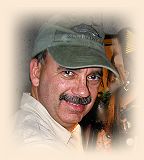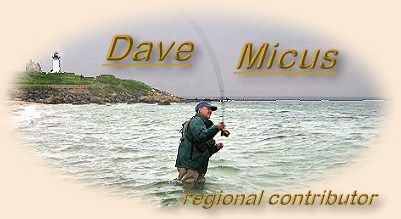|
We saltwater fly-flingers aren't real literary types.
If we were, we'd fish dry flies. Our chosen sport
brings us to the crashing surf in contact with creatures
that, at the least, could bite your fingers clean off -
an environment more conducive to composing new
combinations of obscenities, not poetry. We leave
the literary insights to those softly casting tiny
fluffs of fur on gently flowing streams.
That's not to say that we don't have our books; we
just have fewer of them and they are likely to have
ringed covers from doubling as beer coasters. What
follows are my suggestions for the books that make up
the essential striped bass fisherman's library.
HOW TO:
When you're just starting in the salt it's important
to have a few how-too books, but you really don't need
to read a thirty page chapter titled 'equipment' to
learn that you should fish a nine-foot nine-weight
rod with an intermediate line and a nine-foot leader
tied to either a clouser or deceiver in white or
chartreuse. Brevity is the key to instructional
books; hell, we want to be fishing, not reading
about fishing.
Ken Abrames Striper Moon is an eclectic
book that I'm hesitant to classify as "how-too," as
it is really much more than that. But it does provide
a wonderful introduction to the sport with useful
information as well as interesting anecdotes written
in a literary style that is a joy to read. Jack Gartside's
Striper Strategies is a small in size but
immense in knowledge. At a time when how-too fishing
books are as ponderous as college calculus texts, these
two works are enjoyable reads as well as valuable resources.
FLY TYING:
My favorite fly tying book is A.K. Best's Production
Fly Tying. Though it doesn't deal exclusively with
salt-water patterns, there is plenty of excellent information
about tying flies that easily translates to any type of tying
you might do. A Fly-fishing Guide to Saltwater Naturals
and Their Imitations by George V. Roberts, Jr., is a
helpful book that provides information about the various
saltwater baitfish as well as the best patterns to imitate
them. My only complaint about this book is I wish it had
a clear table of what baitfish are prevalent at which time
of year. Striper Moon and Striper
Strategies both have chapters on productive
striped bass fly patterns.
GENERAL INFORMATION:
It's necessary to have some background in the sport,
as it will add to your conversational aptitude so you
can impress others at those black tie soirées that we
fly fishers just can't seem to avoid. Striper
by John Cole and Men's Lives by Peter
Matthissen are two books that provide interesting
background on the commercial striped bass fishery
as practiced by the fishing families who plied their
trade in the Hamptons before it became the playground
of the New York glitterati. Reading the Water
by Robert Post was a heretofore-rare book (I paid three
figures for my copy and that doesn't include the decimal
places) that has just been re-released in paperback.
It profiles the dedication and subterfuge of the
striped bass fishing fanatics on Martha's Vineyard
in their quest to hook the big one. Eastern
Tides by Frank Daignault is a fascinating
autobiography of one of the best surf casters to
have ever left footprints in the sand on the New
England shore. Though not much attention is devoted
to fly fishing, there is still a wealth of knowledge
to be mined from someone who has been fishing the
striper coast for forty years.
Thomas McGuane's The Longest Silence is,
in my not so humble opinion, the best contemporary
book written about fly-fishing. While only one story
is devoted to striped bass fishing, all the stories
remind us just why we have the salt in our veins,
written in that distinct McGuane style that is a
pleasure to the eye and ear. Angler's Coast
by Russell Chatham is a series of stories detailing
the quest for anadromous fish species, including the
striped bass. Chatham's style, like McGuane's, is
more literati, less guide, with as much attention
paid to the flow of words as to the flow of water.
Both are a delight to read.
*****
Books are good enough in their own way, but they are
a mighty bloodless substitute for life, wrote Robert
Louis Stevenson, and books about fishing are a poor
substitute for wetting a line. But if you are land
bound and need a fix of the brine to get you through,
the above books should provide solace until you can
once again cast a line in the crashing surf. ~ Dave
About Dave:
 Dave Micus lives in Ipswich, Massachusetts. He is an
avid striped bass fly fisherman, writer and instructor.
He writes a fly fishing column for the Port City Planet
newspaper of Newburyport, MA (home of Plum Island and Joppa Flats)
and teaches a fly fishing course at Boston University.
Dave Micus lives in Ipswich, Massachusetts. He is an
avid striped bass fly fisherman, writer and instructor.
He writes a fly fishing column for the Port City Planet
newspaper of Newburyport, MA (home of Plum Island and Joppa Flats)
and teaches a fly fishing course at Boston University.
|



